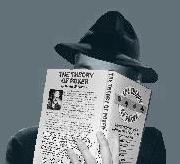Fingering Those Four-Flushers (Redux)
 That problem I discussed in my previous post continues to linger in my mind. Ran into the same situation more than once over the last couple of days of play. For example, had a hand where I was dealt
That problem I discussed in my previous post continues to linger in my mind. Ran into the same situation more than once over the last couple of days of play. For example, had a hand where I was dealt 
 in the cutoff and raised. Only one caller (the big blind). Flop comes
in the cutoff and raised. Only one caller (the big blind). Flop comes 

 . He checks, I bet, he calls. Turn is the
. He checks, I bet, he calls. Turn is the  . He checks, I bet, he calls. River is the
. He checks, I bet, he calls. River is the  . He checks, I check, and he shows
. He checks, I check, and he shows 
 . Don’t know if he’d have called a bet on the end, but given how he’d played the hand he probably would have as there would have been $6.25 in the pot. I won the hand but (likely) lost an extra big bet. I decided it was time to consult the experts about the problem.
. Don’t know if he’d have called a bet on the end, but given how he’d played the hand he probably would have as there would have been $6.25 in the pot. I won the hand but (likely) lost an extra big bet. I decided it was time to consult the experts about the problem. David Sklansky has a chapter titled “Heads-Up On The End” in his The Theory of Poker where he addresses this very circumstance. The chapter is divided into “first position play” and “last position play.” Since the difficulty I face comes up most frequently when I am in last position, I reviewed what Sklansky had to say there.
He talks about those times when the last card comes and your opponent bets out and those times when your opponent checks to you. Now when I’m only holding top pair and that third heart appears, if my opponent bets out I’m definitely only going to call. That’s essentially what Sklansky recommends here -- he says to raise if I think I have a better hand or if I think my opponent is bluffing, but otherwise just to call. (Pot odds generally mean folding isn’t an option.) Since I usually don’t know if my opponent is bluffing in this situation, and since I also usually am not certain I have a better hand here, I call.
Now those times when my opponent checks to me on the end, Sklansky says “Bet your hand for value if you are a favorite,” but “don’t bet in close situations to avoid a check-raise.” As I’ve already established, I consider this a close situation, especially if multiple players saw the flop and only one or two of them decided to chase it to the river against me. So it appears Sklansky is here telling me that checking behind (as I have usually been doing) is probably a sound play.
It's important to note that Sklansky is offering only general guidelines in The Theory of Poker. For more particular advice about my game -- low limit hold ’em -- I go to Miller/Sklansky/Malmuth’s Small Stakes Hold ’em. In the back of the book they list a series of “Hand Quizzes,” and, in fact, the very last one closely resembles the “four-flusher” situation I’m investigating. In their example, you are dealt big slick on the button and two limpers call your raise. You flop a king (with two diamonds on the board), and so bet your top-pair, top-kicker. Both limpers check-call. The turn is a non-diamond blank, and both limpers again check-call. Then the river puts a third diamond on the board and your two opponents both check it to you.
This is precisely where I’ve almost always been checking down the hand, but Miller/Sklansky/Malmuth say this is a time to bet. Their reasoning is that “it is more likely that you are still ahead after your opponents check [on the river] than it is before they check.” It is also true that your opponent isn’t always going to check-raise you, even if he has hit his hand. They then add a “game theory”-type explanation that I’m not going to try to paraphrase here (see pp. 308-09 of SSHE, if'n yr innersted) that essentially says not betting here causes you to lose more bets in the long term than betting does.
I see how it is more likely that if my opponent(s) check to me in late position here -- as the fellow with the pocket fours did -- that I’m still ahead. Most who make their flush will indeed bet out on the end so as not to miss getting one more big bet on the river. Now that I think about it, I don’t recall that many instances where I check that hand down and then see my opponent has made his flush.
Every situation is different, of course, but I think I’ll probably be betting out here more often than I have been in the past. As Miller/Sklansky/Malmuth say, "Do not let every river card scare you. Bet!"
Photo: Tom Neal from the 1945 film Detour (adapted), public domain.
Labels: *shots in the dark, David Sklansky, Ed Miller, limit hold'em, Mason Malmuth, Small Stakes Hold 'em, The Theory of Poker













0 Comments:
Post a Comment
<< Home